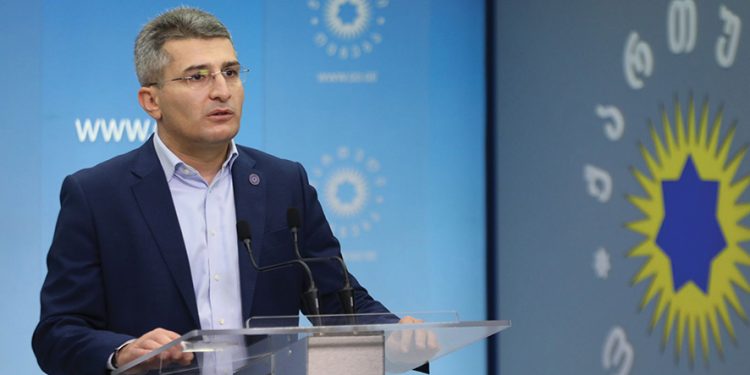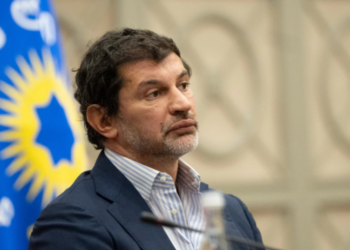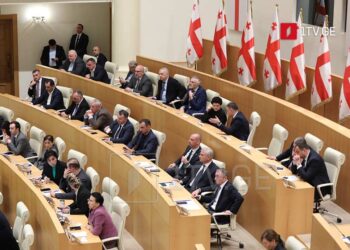Georgia’s ruling party Georgian Dream this week submitted its planned homophobic bill.
At the briefing held at their party office on March 25, the executive secretary of Georgian Dream, Mamuka Mdinaradze, said that they will initiate constitutional changes, where “guarantees of family values and protection of minors will be clearly written”. However, at this stage, the ruling majority, together with the European Socialists loyal to it, do not have the necessary 113 votes to accept the constitutional amendments.
Mdinaradze noted that the ruling party will, in the near future, also initiate more specific changes in “several dozen laws,” which will be “guaranteed” to be adopted this year. Making changes to the law requires a maximum of 76 votes, which Georgian Dream has.
Of the constitutional amendments, Mdinaradze said, this concerns Article 30 of the Constitution, where the definition of marriage is defined. He claimed that a third article will be added to this article, with the following content: “The protection of family values and minors is ensured by the constitutional law of Georgia, which is an integral part of the Constitution of Georgia.”
Mdinaradze noted that the draft constitutional law “On Family Values and Protection of Minors” consists of 8 points:
1. Based on the legislation, only such a relationship similar to marriage can be regulated, which provides for the union of a man and a woman who are at least 18 years old.
2. Adoption or foster care of a minor is allowed only by married spouses or heterosexual persons in accordance with the Constitution and legislation of Georgia.
3. Any medical intervention related to the change of human sex is prohibited.
4. The document issued by the state or local self-government indicates only the female or male gender that corresponds to their genetic data.
5. Any decision of a public authority or a private person that directly or indirectly restricts the use of concepts defined by gender is invalid.
6. Gatherings aimed at promoting same-sex family or intimate relationships, incest, adoption or foster care of a minor by a same-sex couple or a non-heterosexual person, medical intervention related to gender reassignment, or the non-use of gender-specific concepts are prohibited.
7. It is prohibited to distribute work, program or other material with such content which is aimed at promoting same-sex family or intimate relationships, incest, adoption or foster care of a minor by a same-sex couple or a non-heterosexual person, medical intervention related to sex change or the non-use of gender-specific concepts.
8. It is prohibited to provide information in the educational process of a public or private educational institution that is aimed at promoting same-sex family or intimate relationships, incest, adoption or foster care of a minor by a same-sex couple or a non-heterosexual person, medical intervention related to sex change, or the non-use of gender-specific concepts.
At the same time, Mdinaradze said he does not rule out the possibility of banning Pride outright.
“If their assembly serves the protection of rights and the expression of freedom, neither their assembly nor that of others can be prohibited. But if you want any gathering to be about Pride and you want anyone to popularize and publicize this topic, in this case it will be prohibited,” he said.
Mdinaradze noted that if the opposition does not support these constitutional amendments, they will reflect these norms in different laws. When asked whether these constitutional changes are being initiated because it would be unconstitutional to make changes to laws without amending the constitution, Mdinaradze answered that they “will not adopt unconstitutional changes.”

Interestingly, there is no research by any authoritative scientific organization that says any kind of “propaganda” can change a person’s sexual orientation or gender identity. Yet Georgia, primarily an Orthodox Christian nation, maintains strong social conservatism, evidenced by polls indicating widespread disapproval of same-sex relationships among its populace. In recent times, Tbilisi’s yearly Pride parade has evolved into a focal point, marred by confrontations as far-right demonstrators target LGBTI advocates. Same-sex marriage has been constitutionally prohibited in Georgia since 2018.
On Wednesday, the CoE released a statement from the Council of Europe Commissioner for Human Rights, Dunja Mijatovic, condemning the proposed changes.
“I am concerned about the present political discourse in Georgia, as illustrated by the announcement made by the Georgian Dream Party, of their initiative to amend the Constitution and to adopt a new constitutional law on ‘Protection of Family Values and Underaged Persons’,” Mijatovic told the Council. “It is reflective of the entrenched harmful stereotypes and prejudice against LGBTI people which still prevail in segments of Georgian society, including some politicians, and is capable of having a strong, negative impact on the human rights, safety and well-being of LGBTI people and defenders of their rights. It also represents the political manipulation of LGBTI-phobia in the run-up to the elections, which I have previously condemned, and which should have no place in a democratic society, based on the rule of law and respect for human rights of everyone.”
With LGBTI people continuing to be the target of hate crimes and pervasive discrimination in Georgia, as well as the regular occurrence of LGBTI people being denied their right to peaceful assembly, Mijatovic has repeatedly called on the Georgian authorities to commit to a zero-tolerance policy and practice towards all forms of discrimination, and incitement to discrimination and violence, against LGBTI people.
“In recent months, I have followed the increasingly stigmatizing rhetoric used by some politicians to undermine the legitimate work of human rights defenders and civil society in Georgia,” she noted.
“I therefore call on the Georgian authorities to fully respect their human rights obligations, as a member state of the Council of Europe, including with regard to protecting the human rights of LGBTI people and ensuring an enabling environment for the activities of civil society and human rights defenders. I urge all politicians in Georgia to resolutely denounce the use of LGBTI-phobia or any other discriminatory rhetoric in electoral campaigns.
“I stand in solidarity with all those who advocate for and defend the human rights of every member of Georgian society, including LGBTI people, and who work for a peaceful country and society committed to equality and the human dignity of all.”
Khatia Dekanoidze, a deputy of the opposition EuroOptimists party, claimed Georgian Dream are using such topics to distract society, but that it will not work.
“I’m sure this was invented only to try to discredit the opposition, which will not happen, because the citizens of Georgia are worried about completely different problems,” she said.
“People are not worried about this topic, only Georgian Dream talks about it and no-one else,” she claimed. “This is a part of the propaganda, it is a continuation of what is meant to keep Bidzina Ivanishvili in power at any cost, but I think it will simply become a failed project on the part of Georgian Dream.”
By Team GT














